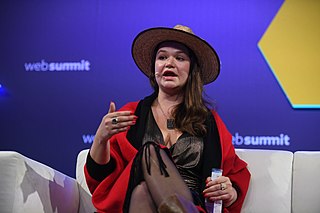A Quote by Maelle Gavet
It simply isn't acceptable for the likes of Google, Facebook, Amazon and others, which amass data by the terabyte, to say, 'Don't worry, your information's safe with us, as all sorts of rules protect you' - when all evidence suggests otherwise.
Related Quotes
All sorts of factors contribute to what Facebook or Twitter present in a feed, or what Google or Bing show us in search results. Our expectation is that those intermediaries will provide open conduits to others' content and that the variables in their processes just help yield the information we find most relevant.
And I know that sounds outrageous, but it's true. Such monopolies as Google, Facebook, Amazon, Apple are trying to stay with us from the moment that we wake up in the morning until the moment that we go to bed at night. They want to become our personal assistants. They want to become the vehicles to deliver us news, entertainment, to track our health. They want to obey our every beck and call through Amazon Alexa and Google Home.
Google, Amazon, Apple. Any number of cloud providers and computer service providers who can increasingly limit your access to your own information, control all your processing, take away your data if they want to, and observe everything you do; in a way, that does give them some leverage over your own life.
Fifty years ago, the way that we consumed food was revolutionized. We began eating processed foods, and it seemed amazing. And then we woke up many decades later, and we realized that food was engineered to make us fat. And I think that such companies as Google, Facebook, Amazon, Apple are doing the same thing with the stuff that we ingest through our brains. They're attempting to addict us, and they're addicting us on the basis of data.
On Amazon, you find retailers that want Amazon to do part of their services. Those, you don't find to the same degree on Google Shopping. On Google Shopping, you find sort of the bigger brands, those who want to have the customer relationship themselves - the data, the payment details, the search patterns.
I am the most concerned that we end up in a situation where your - everything is known about you and so therefore, not only Google, but Google, Facebook, Twitter - the whole set of companies - essentially knows all your weaknesses and therefore how to manipulate you in subtle ways in order to have you do things you might not otherwise do.
It isn't that information is exploding, but accessibility is. There's just about as much information this year as there was last year; it's been growing at a steady rate. It's just that now it's so much more accessible because of information technology. The consensus is that a Web crawler could get to a terabyte of publicly accesible HTML. A terabyte is about a million books. the UC Berkeley library has about 8 million books, and the Library of Congress has 20 million books.

































